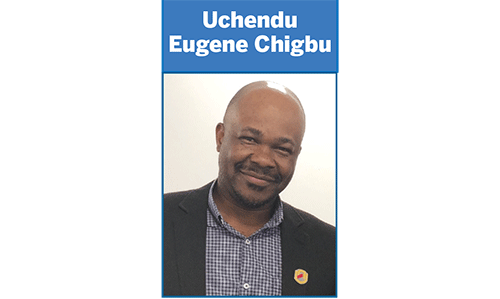Uchendu Eugene Chigbu
It is 2023. I am unmoved by the argument that people will achieve economic wealth simply by having access to land. The evidence to having land not being everything is here in Africa. In a vast majority of African countries - and I am being economical with the truth here to avoid being accused of romanticising the African situation - even those with secure land are not necessarily wealthy. Look at our farmers in Africa. The majority are poor. Look at the European farmers, and you will note a significant difference. In Europe, the majority of farmers are wealthy.
So, having land is one thing, but turning the land into economic wealth is another. The latter requires knowledge and the skill to use the land in ways that lead to economic wealth. I have stated this truth here, hoping that all exuberant land champions (those who live on the picket line) would not start throwing their toys out of their cots. All I have said here is that merely having land is not enough for sustainable living.
Skills and knowledge matter, as much as the land is needed.
However, having a secure and productive parcel of land (no matter how small) is critical to sustaining household livelihoods. This is because land has a direct link to land tenure security (protection against forced eviction, harassment and other threats associated with the use of land) and food security (physical and economic access to food for a healthy life.).
In the context of Africa, its direct relationship to tenure security and food security makes us promote it as a tool for economic freedom. With the required skills, land (even if it may not make you wealthy) can enable a sustainable livelihood.
This is not easy, though, because land use comes with many paradoxes.
Paradoxes of land use
There are many paradoxes associated with the use of land. People leave the rural areas to come and occupy unplanned and unserviced lands around cities (informal settlements). The governments are expected to service those lands (informal settlement upgrading) to ensure that informal settlers are not excluded from city life. Humanity must reduce agricultural land use to conserve forests and mitigate climate change.
Nevertheless, we must produce more food to feed a growing population. How are governments of hungry citizens expected to put policies in place to ban land clearing? Looking at available land data on these issues helps one understand the extent of these challenging paradoxes.
For instance: Rearing livestock requires more land per calorie than crops. Producing beef is 100 times land-demanding as cultivating potatoes, and 55 times as land-demanding as cultivating nuts and peas.
Livestock now uses about 80% of agricultural land globally while producing less than 20% of calories.
Demanding where one is located, both crop and animal farming lead to massive bush-clearing. Put differently - the future of livestock farming must be compromised (it seems), even though it is central to the survival of millions of people in Africa.
Mineral exploration and crop farming are the key drivers of bush-clearing in the Niger Delta of Nigeria and the Congo forests. Cattle are the leading drivers of deforestation in the Amazon region of South America, followed by soybean (a crop also cultivated for feeding chickens and pigs). So, how do we reduce cattle- rearing to conserve land, while hoping to produce enough meat for the daily calorie needs of current and future populations?
Since every parcel of farmland in Africa is essential for producing more food and conserving animal and plant species, we cannot solve these paradoxes without reimaging how we plan and use land.
These land use paradoxes are a challenge for governments at the policy level. Knowledge and skills are crucial to link the individual and household levels. Therefore, the knowledge of tenure-responsive land-use planning is necessary for all, especially land practitioners and policymakers engaged in land matters. Creativity and innovation are necessary to make it work at the political level.
Tenure-responsive LUP
Land-use planning (LUP) involves making decisions and conducting activities that determine the best uses to which land can be put to ensure that it is productive to people and valuable to the environment.
The decision and activity issues in LUP are done to organise land use in ways that benefit people who live on or use the land and the environment. It is called tenure responsive LUP when this is done to strengthen land tenure or the relationship among people as individuals and groups regarding land and other natural resources.
The tenure-responsive LUP is a product of the Global Land Tool Network (GLTN) developed by its partners, led by the Namibia University of Science and Technology (NUST). It is a tool that technically links tenure security and LUP. It does this because it is based on a process that identifies the most appropriate uses in any land development.
The steps involved in the tenure-responsive LUP are designed to ensure structured and scalable improvements to land tenure security for everyone (for men, women and the youth) on statutory and customary land based on participatory fit-for-purpose (or locally realistic) measures.
Uchendu Eugene Chigbu is an associate professor (Land Administration) in the Department of Land and Spatial Sciences (DLSS) at the Namibia University of Science and Technology. The views expressed in this article are entirely his, and not that of NUST.


